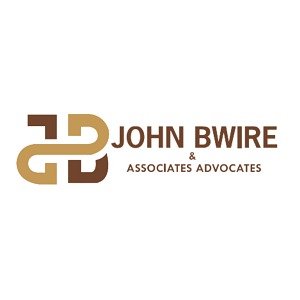Best Acquisition / Leveraged Finance Lawyers in Kenya
Share your needs with us, get contacted by law firms.
Free. Takes 2 min.
Or refine your search by selecting a city:
List of the best lawyers in Kenya
Legal guides written by Adroit Law LLP:
- Kenya Launches Digital Nomad Visa: A Gateway for Remote Workers
- Navigating the Payment System License Maze in Kenya
- Navigating the Complexities of Mining Licenses and Permits in Kenya: A Look into Artisanal and Large-Scale Operations
About Acquisition / Leveraged Finance Law in Kenya
Acquisition and leveraged finance law in Kenya refers to the legal frameworks, practices, and processes that govern the funding of mergers, acquisitions, and strategic buyouts of companies or assets in the country. Acquisition finance involves raising capital specifically for acquiring another business, while leveraged finance typically uses a significant amount of borrowed funds, often secured against the assets being acquired. The Kenyan legal environment for these transactions is shaped by a combination of local regulations, banking practices, taxation rules, and international trends due to cross-border deals. The sector is growing in response to Kenya's expanding economy, increased foreign direct investment, and greater private equity activity.
Why You May Need a Lawyer
You may need the services of a lawyer specializing in acquisition and leveraged finance in Kenya for several reasons. Legal professionals can help structure complex transactions, ensure regulatory compliance, draft and review loan or acquisition documents, and identify risks and liabilities. Lawyers are especially valuable in transactions involving multiple stakeholders, cross-border elements, or sectors with additional regulations such as telecommunications, banking, or energy. Common situations requiring legal expertise include buyouts, mergers, securing financing for acquisitions, syndicated loan arrangements, restructuring of corporate debt, and due diligence of target companies. A skilled lawyer can offer critical guidance throughout negotiations and protect your interests.
Local Laws Overview
Kenya has specific laws and regulations that affect acquisition and leveraged finance transactions. The Companies Act 2015 governs company structures, mergers, and takeovers. The Capital Markets Act regulates public offers and disclosures, particularly relevant in public company transactions. Lending and financial transactions are overseen by the Central Bank of Kenya through the Banking Act and prudential guidelines. Additionally, the Competition Act requires prior approval for mergers that might affect competition in Kenyan markets. Legal practitioners must also consider tax implications under the Income Tax Act, stamp duties, and regulatory reviews by agencies such as the Competition Authority of Kenya and where applicable, sector-specific regulators. Security interest arrangements must align with the Movable Property Security Rights Act, which introduced modern rules for collateral.
Frequently Asked Questions
What is acquisition finance?
Acquisition finance refers to the funding provided to facilitate the purchase of a company, asset, or business shares. This often includes loans, bonds, or other credit facilities tailored for mergers or acquisitions.
What is leveraged finance?
Leveraged finance involves using significant borrowed funds to acquire a company or asset. The financing is often secured against the assets of the target company, with the expectation that the acquisition will generate enough cash flow to service the debt.
Do I need regulatory approval for a business acquisition in Kenya?
Yes, many acquisitions, especially those meeting certain thresholds or affecting competition, require approval from regulatory bodies such as the Competition Authority of Kenya. Some industries, like banking and telecommunications, have additional regulatory layers.
How is due diligence conducted in acquisition deals?
Due diligence involves a thorough investigation of the target company’s financials, legal standing, assets, liabilities, and compliance history. It helps identify risks and inform negotiations or conditions for closing deals.
Can foreigners participate in acquisition finance in Kenya?
Yes, foreign investors can participate, but may face restrictions in certain sectors such as land ownership and representation in specific regulated industries. All cross-border transactions must comply with currency, taxation, and investment regulations.
What legal documents are needed for an acquisition?
Key documents include sale and purchase agreements, loan agreements, security documents, warranties, disclosure letters, and regulatory filings. The specific documents depend on the transaction structure.
What are common sources of acquisition finance in Kenya?
Common sources include commercial bank loans, syndicated loans, private equity and venture capital funding, mezzanine financing, and, in some cases, bonds or capital market instruments.
What risks are associated with leveraged finance?
Risks include high interest costs, potential cash flow shortages, risk of asset seizures if repayments are not met, covenant breaches, and exposure to interest rate or currency fluctuations.
How does the Movable Property Security Rights Act affect acquisition finance?
This Act modernizes how lenders can secure interests over movable assets, making it easier and faster for financiers to register and enforce security, thus encouraging more flexible acquisition and leveraged finance arrangements.
How are taxes handled in acquisition and leveraged finance deals?
Tax implications depend on deal structure. Considerations include stamp duty on documents, capital gains tax, withholding taxes on interest payments, and VAT on relevant services. Legal advice is necessary to optimize tax exposure.
Additional Resources
Several resources can assist individuals or businesses seeking information or support in acquisition and leveraged finance:
- Competition Authority of Kenya: Regulates merger control and competition compliance - Capital Markets Authority: Oversees capital market participation and disclosures - Central Bank of Kenya: Oversees banking regulations and guidelines - Registrar of Companies: Handles company registrations, compliance, and filings - Kenya Revenue Authority (KRA): Provides information on tax matters related to acquisitions - Law Society of Kenya: Directory for finding regulated legal practitioners with relevant experience - Kenya Private Sector Alliance (KEPSA): Offers insights into private sector investments and partnerships
Next Steps
If you are considering or planning an acquisition or leveraged finance transaction in Kenya, begin by outlining your objectives and the scope of your intended transaction. Engage a qualified lawyer experienced in acquisition and leveraged finance as early as possible to help navigate the complexities of structuring, regulatory compliance, due diligence, documentation, and negotiations. Prepare relevant documents, financial statements, and background information for a clear and efficient process. Reach out to recognized law firms or the Law Society of Kenya for referrals to specialists in this field. Professional legal guidance will minimize risks and increase the likelihood of a successful outcome.
Lawzana helps you find the best lawyers and law firms in Kenya through a curated and pre-screened list of qualified legal professionals. Our platform offers rankings and detailed profiles of attorneys and law firms, allowing you to compare based on practice areas, including Acquisition / Leveraged Finance, experience, and client feedback.
Each profile includes a description of the firm's areas of practice, client reviews, team members and partners, year of establishment, spoken languages, office locations, contact information, social media presence, and any published articles or resources. Most firms on our platform speak English and are experienced in both local and international legal matters.
Get a quote from top-rated law firms in Kenya — quickly, securely, and without unnecessary hassle.
Disclaimer:
The information provided on this page is for general informational purposes only and does not constitute legal advice. While we strive to ensure the accuracy and relevance of the content, legal information may change over time, and interpretations of the law can vary. You should always consult with a qualified legal professional for advice specific to your situation.
We disclaim all liability for actions taken or not taken based on the content of this page. If you believe any information is incorrect or outdated, please contact us, and we will review and update it where appropriate.
Browse acquisition / leveraged finance law firms by city in Kenya
Refine your search by selecting a city.

















